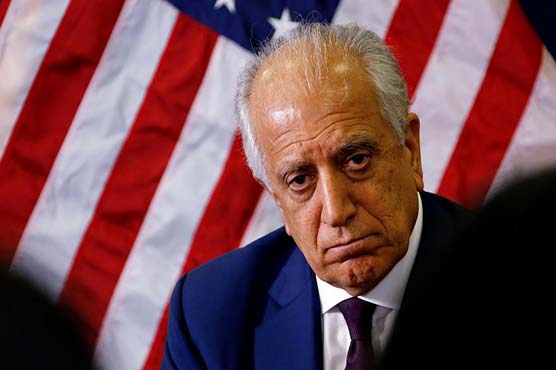US peace envoy visits Kabul to consult president on talks with Taliban

A fresh round of talks between Khalilzad and the Taliban is expected to take place on February 25.
KABUL (Reuters) - U.S. special envoy Zalmay Khalilzad arrived in Kabul on Sunday to try to secure cooperation from Afghanistan s president after breakthroughs in peace negotiations with Taliban leaders in Qatar.
With Khalilzad and his boss U.S. Secretary of State Mike Pompeo, as well Taliban officials, hailing progress towards ending America s longest war, he must now win over President Ashraf Ghani -- whose government the Taliban have so far kept out of the process.
Six days of talks ended in Qatar on Saturday with key parts of a draft pact mapped out, including an 18-month timeline for the withdrawal of foreign troops after the completion of a deal, according to Taliban officials.
The draft also includes assurances from the hardline Islamic group that it will not allow Afghanistan to be used by al-Qaeda and Islamic State to attack the U.S. and its allies - a core U.S. demand. Similar assurances involving other groups are given to Pakistan in the draft pact.
The Taliban also want to be part of an interim government after any ceasefire, Taliban sources said.
It was not clear whether the draft described by the Taliban sources was acceptable to both sides or when it could be completed and signed.
A fresh round of talks between Khalilzad and the Taliban is expected to take place on February 25 in Doha, two senior Taliban sources said.
While he has not been directly involved up until now, Ghani s role is likely to grow as a full deal gets closer and diplomacy intensifies.
Without going into detail on Saturday night, Khalilzad said in tweets that nothing could be agreed without an intra-Afghan dialogue and a full ceasefire.
"He (Khalilzad) will inform Ghani and his officials about all the developments, seek their opinion before travelling back to Washington," a senior Afghan official said on conditions of anonymity.
Khalilzad is also due to brief top regional diplomats on Monday morning.
GHANI S OPTIONS
Western diplomats describe Ghani as being in a tight spot, with no authority to decide on the troop departure and the final decision to declare the ceasefire resting with the Taliban.
He, however does enjoy the power to decide to support an interim government rather than push for presidential elections which could prove to be a distraction to the peace effort.
So far he has rejected talk of an interim government. "It is time for Ghani to choose between elections or peace process," said a western diplomat based in Kabul.
Despite the progress on a pact, violence is widely expected to continue, with the Taliban mounting daily attacks against the Afghan government and its security forces.
The Taliban now control about half of Afghanistan s territory and Ghani said in Switzerland last week that 45,000 members of the country s security forces had been killed since he took office in 2014.
A former Taliban leader said despite a agreement for an 18-month withdrawal, he predicted intense fighting ahead.
"I think Taliban won t stop their fight until they get 100 percent sure that foreign forces are leaving Afghanistan," said Sayed Mohammad Akbar Agha, who heads Ways to Save Afghanistan, an independent group run by tribal elders and religious scholars working towards securing peace.

